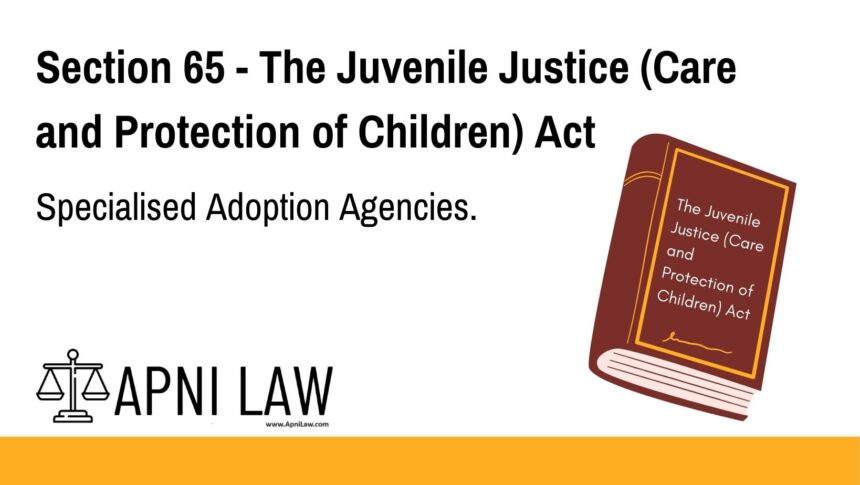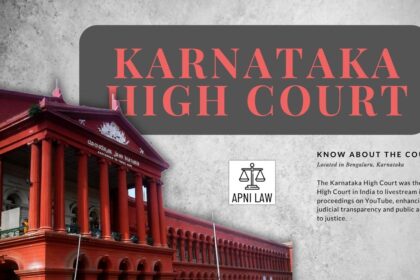Code: Section 65 JJ Act
(1) The State Government shall recognise one or more institutions or organisations in each district as a Specialised Adoption Agency, in such manner as may be provided in the adoption regulations framed by the Authority, for the rehabilitation of orphan, abandoned or surrendered children, through adoption and non-institutional care.
(2) The State Agency shall furnish the name, address and contact details of the Specialised Adoption Agencies along with copies of certificate or letter of recognition or renewal to Authority, as soon as the recognition or renewal is granted to such agencies.
(3) The State Government shall get every Specialised Adoption Agency inspected at least once in a year and take necessary remedial measures, if required.
(4) In case any Specialised Adoption Agency is in default in taking necessary steps on its part as provided in this Act or in the adoption regulations framed by the Authority, for getting an orphan or abandoned or surrendered child legally free for adoption from the Committee or in completing the home study report of the prospective adoptive parents or in obtaining adoption order from the District Magistrate within the stipulated time, such Specialised Adoption Agency shall be punishable with a fine which may extend up to fifty thousand rupees and in case of repeated default, the recognition of the Specialised Adoption Agency shall be withdrawn by the State Government.
Explanation of Section 65 JJ Act
Section 65 of the Juvenile Justice Act outlines the establishment, operation, and accountability of Specialised Adoption Agencies (SAAs). These agencies play a crucial role in ensuring the smooth adoption and care of orphaned, abandoned, and surrendered children.
Key Provisions:
- Each district must have one or more recognised SAAs, as defined in CARA’s adoption regulations.
- These agencies are responsible for facilitating adoption and providing non-institutional care.
- The State Government must inspect each agency annually and take corrective action if needed.
- State Agencies must submit recognition certificates, contact details, and other key information to the Central Authority.
- If an SAA fails to perform its duties—such as preparing legal documentation for adoption or completing the home study of prospective parents—it may be fined up to ₹50,000.
- In cases of repeated negligence, the State Government must cancel the agency’s recognition.
Overall, Section 65 ensures that SAAs operate within a regulated, transparent, and accountable system.
Illustration
Example 1: Recognition of a New SAA
A non-governmental organisation applies to be recognised as a Specialised Adoption Agency. After reviewing its credentials, the State Government grants recognition. It then submits the agency’s details and recognition certificate to the Central Authority for record-keeping.
Example 2: Failure to Complete Home Study
An SAA delays submitting a home study report for a prospective adoptive couple. Since this delays the adoption process, the agency is fined ₹25,000. On repeating the same lapse, its recognition is revoked by the State Government.
Common Questions and Answers on Section 65 JJ Act
- What is a Specialised Adoption Agency (SAA)?
An SAA is a government-recognised organisation that handles adoption and care of orphaned, abandoned, or surrendered children in a specific district. - Who recognises SAAs?
The State Government recognises these agencies based on guidelines in CARA’s adoption regulations. - What happens if an SAA fails to comply with adoption timelines?
It can be fined up to ₹50,000. If the violations continue, the agency’s recognition will be cancelled. - How often are SAAs inspected?
At least once every year. The State Government is responsible for these inspections. - Why must SAAs submit their details to the Authority?
So the Central Authority can maintain an up-to-date and verified national registry of all recognised adoption agencies.
Conclusion
Section 65 ensures that Specialised Adoption Agencies remain efficient, transparent, and accountable. It empowers the State to regulate these agencies and penalise delays or misconduct. Ultimately, this provision is essential for protecting the rights of vulnerable children and ensuring timely adoptions.
For more legal updates and detailed insights on adoption procedures, visit ApniLaw.








